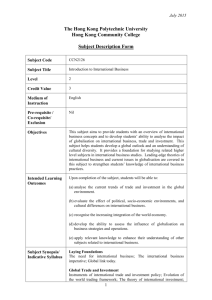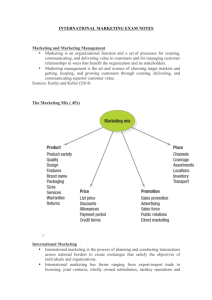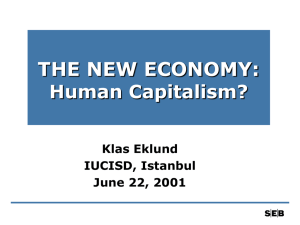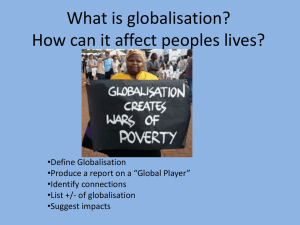“Globalisation Studies Past and Future: A Dialogue of Diversity”
advertisement
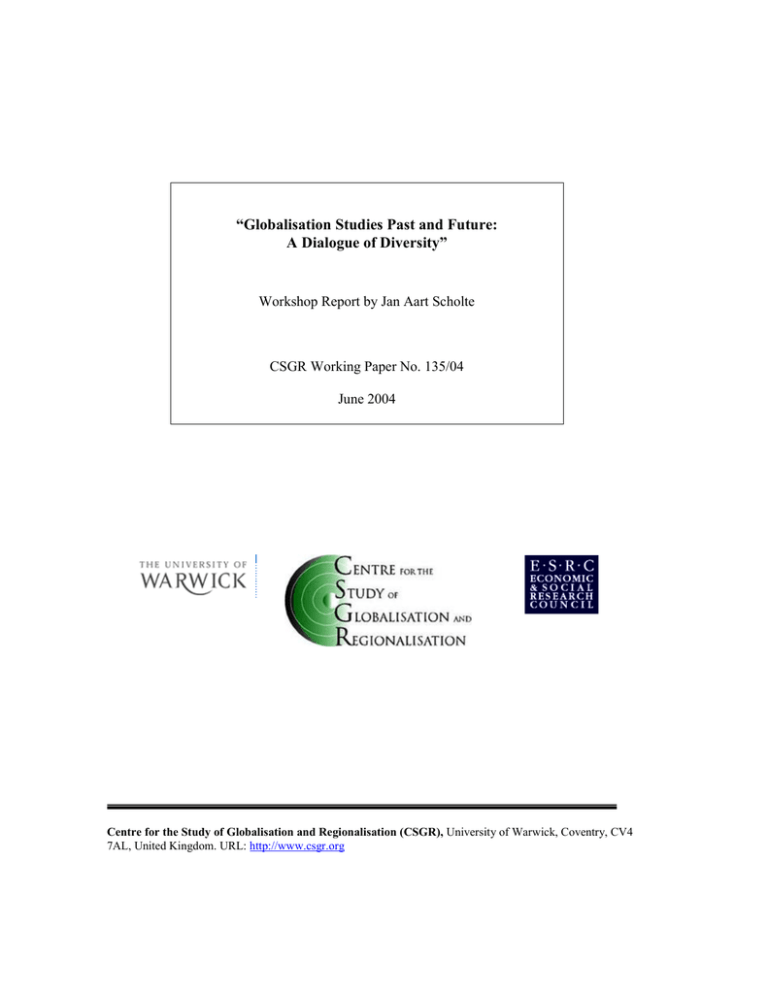
“Globalisation Studies Past and Future: A Dialogue of Diversity” Workshop Report by Jan Aart Scholte CSGR Working Paper No. 135/04 June 2004 Centre for the Study of Globalisation and Regionalisation (CSGR), University of Warwick, Coventry, CV4 7AL, United Kingdom. URL: http://www.csgr.org Globalisation Studies Past and Future: A Dialogue of Diversity Workshop Report by Jan Aart Scholte Centre for the Study of Globalisation and Regionalisation, University of Warwick CSGR Working Paper No. 135/04 June 2004 Abstract This report summarises the proceedings of an interdisciplinary and intercultural roundtable held at CSGR in February 2003 to assess the past development and future prospects of globalisation studies. The discussions focused on three general questions: namely, definitions of globalisation; methodologies of globalisation studies; and normative challenges facing academic research on globalisation. The paper compiles the perspectives on these three issues of 27 participants heralding from 15 countries and a dozen fields of study. Keywords: globalisation, globality Address for correspondence: Jan Aart Scholte Centre for the Study of Globalisation and Regionalisation University of Warwick Coventry CV4 7AL scholte@warwick.ac.uk 2 Introduction As the existence of CSGR and other such institutes attests, globalisation studies are a major new area of academic endeavour. Notions of ‘globality’ (the condition) and ‘globalisation’ (the development) first appeared in research and policy circles only twenty years ago. Yet already a constantly swelling deluge of publications has explored these problems. ‘Globalisation’ has also become the focus of a host of courses, degree programmes, research centres, and now also several professional academic associations. Where has this burgeoning work come so far, and where might it go in the future? In a special initiative to consider the state of the art, Centre for the Study of Globalisation and Regionalisation (CSGR) at the University of Warwick in Britain invited a group of leading scholars from around the world, across the disciplinary spectrum, and with diverse theoretical perspectives and political commitments to join Centre staff in a two-day roundtable discussion. The February 2003 seminar was the first in a series sponsored by the Global Studies Association of the UK (GSA-UK) with funds from the Economic and Social Research Council (ESRC). The twenty-seven participants (listed in the appendix) heralded from fifteen countries and a dozen fields of study. The range of approaches to understanding globality encompassed Buddhism, environmentalism, feminism, liberalism, Marxism, postcolonialism and more. True, diversity was limited inasmuch as all of the contributors were English-speaking professional academics, but in other respects the Warwick colloquium involved a rare if not unique encounter of differences in globalisation research. So what happens when creative thinkers from different fields, different world regions, different theoretical frameworks and different political orientations come together to discuss the current state and future prospects of globalisation studies? The following review summarises the Warwick dialogue of diversity under the headings of the three main questions that the conversations pursued. Thus the first section below recounts arguments made in respect of definitional issues. The second section covers points advanced regarding methodological issues. The third section describes key themes that arose concerning normative and policy issues. In no way did the CSGR roundtable aim to forge an artificial consensus out of widely varying positions on globalisation. Nor do the outcomes described below represent the views of 3 CSGR, the GSA-UK or the ESRC. Rather, it was hoped that exchanges across disciplines, cultures, theories and political persuasions would enhance mutual understanding and perhaps also generate alternative insights that none of the outlooks would produce on its own. Definitional Issues The Warwick colloquium began with a discussion of the challenges of conceptualising globalisation. What do the countless books, journals, courses, degrees, institutes, and associations that have proliferated of late have in mind when they investigate ‘globalisation’? How do scholars from different disciplinary, cultural, theoretical and political perspectives understand the notion? The CSGR dialogue quickly made clear that, although a sense of the global forms part of many intellectual traditions, different disciplines have had different trajectories of globalisation studies. In Sociology, for example, interest in globality arose during the 1980s in good part as a reaction against world-system theory as a framework of thinking about transnational social structure and world-scale social change. For students of International Relations, however, investigations of globalisation have developed largely in opposition to the long-standing state-centric orthodoxy of political realism in that field. In Economics, meanwhile, questions of globalisation have generally been framed in terms of liberal analysis of international trade and finance. For their part, critical literary theorists have taken globalisation to be a legacy of earlier imperialism and as an occasion to deconstruct colonialist texts and discourses. Thus when, as in this colloquium, scholars from different disciplines gather around a single table to discuss globalisation, people can easily talk past each other. In this light it would seem highly unlikely that cross-disciplinary agreement could be reached on a common set of core research questions for globalisation studies. On the other hand, considerable understanding and learning across disciplines can be achieved when – as was evident in this gathering – people have the will to try and communicate. Next to varying disciplinary contexts, definitions of globalisation are also relative to wider social and historical circumstances. As Wang Ning put it, there are many globalisations across many diverse situations in the world. Where you are, Shalini Randeria stressed, shapes 4 your view of globalisation, so it is necessary always to ask from whose position an account of globalisation is given. Illustrating this relativity, Victor Kuvaldin indicated that, in contemporary Russia, conceptions of globalisation tend to be framed in terms of the transition from the Soviet order. From his perspective as a Thai Buddhist, Pracha Hutanuwatr defined globalisation as a new form of colonisation by transnational corporations and consumerism. This process was underpinned by greed and illusion, where shopping malls become a new kind of temple. Fantu Cheru noted that people in Somalia have engaged with globalisation in a stateless condition, while global relations have been all but irrelevant for many villagers in Ethiopia. In short, definitions of globalisation depend very much on where the definer stands. Given this variability, no one expected – and no one got – a consensus definition of globalisation from the CSGR roundtable. Indeed, some participants suggested that conceptions of globalisation are so diverse and contested that there is little purpose in spending too much time on the definitional issue. Implicitly if not explicitly, this point of view could suggest that the concept of globalisation has no particular analytical value. John Whalley noted in this vein that ‘globalisation’ could merely be used as a trendy label for a fundamentally unchanged research agenda. Approached in this way, ‘globalisation’ could become little more than a cynically deployed magnet for funding. The very rationale for globalisation research centres could then be called into question. In contrast, others around the table maintained that explicit and precise definition is both possible and central to any meaningful account of globalisation. On this line of argument, it is crucial to flesh out the various notions, even if, as with all key concepts, the definitions remain to some extent ambiguous and irreconcilable. Diana Brydon suggested that careful definition was all the more important at a time when, owing to the global reach of the publishing trade, studies of globalisation are increasingly read in all sorts of settings that lie outside the context of the authorship. Scholars therefore need to think more consciously and conscientiously about how they communicate their ideas to global audiences. Yet even if one accepts the case for clear and specific definitions of globalisation, can such notions be formulated? Grahame Thompson worried about the capacity of the concept ever to inflate and expand, bringing more and more under its wings, to the point that globalisation was everywhere and nowhere, everything and nothing. Richard Higgott noted that ‘globalisation’ was a hosting metaphor for all manner of developments in post-Cold War 5 international relations, although it could nevertheless be broken down into manageable domains for discussion. In a similar vein, Saskia Sassen argued that it was too loose and general to talk of globalisation only in terms of growing interconnectivity. Kevin O’Rourke remarked that, as an Anglo-Saxon economist, he could readily handle ideas such as ‘trade’ and ‘capital flows’, but ‘globalisation’ was analytically pretty unmanageable. He therefore suggested that researchers should focus on individual dimensions of globalisation and talk less about ‘globalisation’ as such. Might the core significance of the concept relate to geography? It was striking that, in spite of highly disparate ideas associated with ‘globalisation’ across different disciplines and cultures, the Warwick dialogue repeatedly returned to the theme of borders. Saskia Sassen linked globalisation with talk of cross-bordering, un-bordering, and de-bordering: globalisation is about a different type of bordering that is not constructed in terms of the state and the interstate system. Ulf Hannerz noted that globalisation studies had given higher profile in social analysis to questions of boundaries and boundedness. Scholars are now giving more attention to something – borders – that they previously tended to take for granted. While borders were once regarded as implicit and fixed, they are today more often treated as explicit and relative. Annabelle Sreberny maintained that globalisation studies break open boundaries: territorial boundaries, identity boundaries, gender boundaries, and more. A related recurrent theme in the conversation was space. Jan Aart Scholte suggested that every comment on globalisation – from whatever disciplinary and cultural context – has a fairly pronounced spatial aspect. The global relates to an arena and domain of social action, order and experience. In a similar vein, Annabelle Sreberny related globalisation studies to a new spatiality and the challenges of visualising it. Gianluca Grimalda viewed contemporary globalisation as having reached a critical mass that may have caused structural changes in economy and society. Seiji Endo regarded globalisation as a restructuring of social space, albeit that this general insight had not yet been well theorised. However, as numerous colloquium participants emphasised, whatever line one takes on defining globalisation – including a refusal to define – it is a political decision. Fantu Cheru remarked at the hierarchies and political struggles that surrounded definitions of globalisation. Ann Tickner highlighted the crucial question of who gets to define what is defined and added that definition can occur in ways that empower or disempower people. 6 Marcelo Saguier likewise warned that definition could serve a hegemonic purpose. Researchers therefore need to be conscious of how a given conception of globalisation can bolster the positions of some individuals and groups in society and at the same time undercut the positions of others. The neglect of power issues could be extended from the problem of definition to globalisation studies more generally. There was general agreement around the table that investigations of globalisation have often neglected politics: both the politics of substantive globalisation and the politics of how globalisation is studied. Ulf Hannerz highlighted a particular concern that the centre – including academics in circumstances of relative power and privilege on the world scene – is not the right place from which to observe power relations in globalisation. Methodological Issues Following the extensive deliberations on definition summarised above, a second phase of discussions at the CSGR roundtable on globalisation studies focused on methodological problems. Here the concern was how scholars pose (or should pose) questions about globalisation and how researchers proceed (or should proceed) to address those questions. Of course definitional and methodological matters are interrelated. Different definitions of globalisation generate different modes of research, and vice versa. As Ann Tickner put it, your methodology depends on what you are trying to explain and understand in globalisation studies. Conversely, data can determine what you ask and disallow what you might want to ask. Do globalisation studies raise distinctive methodological issues? Does globalisation research require major reorientations of scholarship? Not surprisingly, opinions at the Warwick colloquium were divided on this issue. Several participants suggested that the study of globalisation does not require any methodological adjustments, while several others affirmed that the subject requires a wholesale reorganisation of academic practice. Most views fell between these extremes. Yet across these divergent perspectives was a general agreement that globalisation studies threw into sharp relief the long-standing methodological issue of the relationship between academic disciplines. Everyone around the table accepted that globalisation is not a subject 7 that any one field of study can adequately address by itself. Each of the established disciplines has something important to investigate about globalisation, and none of them holds the final word. However, it is not clear how to assemble insights from different disciplines into a body of knowledge about globalisation, or indeed whether the research process itself needs be interdisciplinary. The roundtable consensus was that cross-disciplinary exchanges and collaborations are helpful in globalisation studies. Moreover, projects that aspire to interdisciplinarity – combining and transcending disciplines – are to be welcomed and nurtured. On the other hand, transdisciplinarity should complement rather than replace discipline-based research. No one advocated that interdisciplinarity should mean postdisciplinarity in the sense of abolishing academic specialisms. Such a development would remove many insights and could also bring unwelcome reductions of diversity in academic knowledge. Another age-old methodological problem of social research that attracted extensive attention at the CSGR colloquium was the issue of culture. In particular, how should globalisation research handle conditions of cultural diversity? Questions of intercultural communication and understanding have become all the more pressing when contemporary globalisation is removing many of the previously prevailing cushions of territorial distance and borders between cultures. No one at the Warwick symposium, whatever their disciplinary or theoretical orientation, argued that globalisation was bringing full-scale cultural homogenisation. The prevailing view was sooner, as articulated by Roland Robertson, that globalisation has heightened awareness of cultural relativity. Globalisation is understood and practised very differently in highly diverse contexts, and there is often fierce resistance to standardisation. In this light, Christine Chinkin suggested, it would be dangerous to replicate the methodology of truth and reconciliation commissions across the world without regard to each specific context. But how can cultural diversity be incorporated into the process of academic enquiry itself? Wang Ning saw globalisation research as an occasion to dethrone Eurocentric knowledge. However, Fantu Cheru recounted his personal uncomfortable post-doctoral discovery that his professional training could not be reconciled with the cultural context of his youth. John Whalley noted that Chinese students of economics rely on western textbooks whose authors know nothing of China. Indeed, urged Roland Robertson, western countries should stop 8 dumping bad knowledge into the Third World. Ann Tickner cautioned that, although contemporary discourse makes much play of celebrating cultural diversity, western knowledge jealously retains its hegemonic power. Diana Brydon stressed the difference between liberal research that ‘manages’ cultural diversity versus methodologies of genuine interculturality that involve real respect, real listening and real interchange. Ulf Hannerz similarly advocated a decentred debate on globalisation where Harvard and Princeton do not set the agenda and many other centres of globalisation studies flourish in marginalized parts of the world. Shalini Randeria suggested that a lot of the problems of cultural hegemony in academic work date from colonialism and that various pre-colonial societies had constructive approaches to difference that could have significant application in respect of globalisation today. Valuable alternative knowledge production was also available from contemporary social movements. On the other hand, several speakers warned that arguments about cultural relativity must not block opposition to evil in globalisation. Grahame Thompson cautioned that respect of cultural diversity must not wax into indifference to inequity: we tolerate the intolerant, but not the intolerable. Pracha Hutanuwatr put the point still more strongly, urging that globalisation studies should begin by speaking of the intolerable and highlighting the truth of suffering. Next to questions of disciplines and culture, a third methodological concern in globalisation studies that attracted much attention in the CSGR colloquium was the unit-of-analysis problem. More particularly, it was asked whether globalisation requires today’s social researchers to abandon inherited habits of formulating questions and pursuing answers in terms of territorial-national-state-society entities. On this matter, too, opinions in the Warwick dialogue were divided. For example, Diana Tussie saw globalisation as a moment to break free of a methodologically nationalist mindset, while Shalini Randeria took globalisation as further evidence that internal-external divisions are unviable in the study of social relations. In contrast, Grahame Thompson argued that the distinction of national and international levels continues to be helpful in the context of contemporary globalisation. Victor Kuvaldin observed that, although the state has adapted and survived very well under globalisation, the trend has also allowed non-state actors to become important in world politics. In a similar vein, Christine Chinkin noted that major revisions of international law 9 are required to extend its coverage beyond states to transborder non-state actors like paramilitary organisations or transnational corporations. Finally on methodology – and related to the unit-of-analysis problem – the CSGR roundtable examined questions of data in globalisation studies. The discussion also asked whether research on globalisation required different kinds of data, assembled and processed in different ways than in methodologically nationalist days of old. For example, how far can global flows be measured in terms of international exchanges? Ben Lockwood reflected on the challenges of measuring globalisation, both in its component parts and in aggregate indices. Paul Kennedy regretted that we lack the tools to measure a number of global phenomena, even though it is clear that something is happening. Ann Tickner noted that conventional statistics have been constructed largely as a tool of the state to assemble information for its needs. Shalini Randeria declared that new kinds of data are needed to answer the new kinds of questions that globalisation studies raise. Using inappropriate data could have major harmful consequences. Normative and Policy Issues The third and final main session of the CSGR dialogue of diversity on globalisation studies turned to normative assessments and prescriptions. What did researchers from different disciplines, cultures, theoretical orientations and political standpoints make of the values and policies that predominate in contemporary globalisation? What alternative directions might be preferable? In a word, what should scholars stand for in respect of globalisation? Pracha Hutanuwatr stated his position with stark clarity. Could globalisation enrich our values and our communities, promoting wisdom, compassion, generosity and closeness to nature? If so, then the trend was to be supported. If not, then it was to be resisted. His view was that current globalisation did not advance a good society, certainly not for the Thai villagers among whom he lived and worked. Several other participants emphasised the plurality of possible courses of globalisation. Victor Kuvaldin argued that liberal westernisation is only one vision of globalisation. There are also African, Chinese, Latin American and Russian perspectives on globalisation. Roland Robertson drew an analytical distinction between globalisation as a social process and 10 globalisation as a political project. The process could be subject to very diverse projects, including Christianity, Islam, Leninism, Nazism and neoliberalism. Where globalisation is taken is a matter of political choice. Everyone around the table agreed that globalisation does not necessarily have to be guided by the neoliberal so-called Washington Consensus, with its focus on macroeconomic discipline, liberalisation and the creation of market institutions. This general policy framework has dominated the past few decades of globalisation, but it is not an inevitable course of globalisation. Participants in the Warwick dialogue acknowledged some potential economic benefits of liberalisation and the need to incorporate sound economics into any policy for globalisation. However, the majority view was that continued neoliberalism was not an advisable way forward. That said, several speakers actually called for increased liberalisation in respect of migration. Seiji Endo argued that immigration controls create a global apartheid. Sian Sullivan similarly advocated a borderless world in which no resident would be ‘illegal’. John Whalley noted that a liberalisation of labour flows would bring a great rise in world income. Ulf Hannerz and Shalini Randeria deplored the brain drain from poor to rich countries under current immigration policies. The brain drain is just one of various aspects mentioned at the Warwick colloquium of growing inequality that has accompanied contemporary globalisation. Fantu Cheru underlined the massive grievances that are felt in the Third World about globalisation owing to inequality. The absence of a priority to global justice in current policy discourse is deplorable. Sian Sullivan stressed that alienation from, anger about, and resistance to globalisation was strongly growing in the North as well as the South. Drawing on the work of John Williamson, author of the phrase ‘Washington Consensus’, Marcus Miller indicated several ways that currently prevailing policies of globalisation could be constructively reformed, for example, with efforts to eliminate corruption and redistribute income. In a similar vein, Diane Stone argued that far more attention needed to be given to the provision of global public goods. Diana Tussie asked whether reform of the existing architecture of multilateral institutions is possible or sufficient. John Whalley was tempted to throw out the old regimes and start wholly anew. 11 With such widespread feelings of injustice, the roundtable agreed, a globalising world would not be a more secure world. Convened against the backdrop of gathering war clouds over Iraq, the CSGR dialogue was highly conscious that globalisation could unfold in tandem with militarisation. In this case, as Toby Dodge indicated, globalisation meant the Bush Doctrine. Grahame Thompson suggested that military intervention has always been a way of the international system, and globalisation has not changed that. Moreover, emergent global military systems of nanotechnology and the like do not raise pleasant prospects for the next generation. Ann Tickner worried that globalisation studies have so far not accorded much attention to problems of armed violence. New theoretical frameworks – different from traditional political realism in International Relations – are needed to understand the military aspects of globalisation. Diane Stone and Diana Tussie each reminded the group that conflict is not all bad and can bring neglected issues into the open. Nevertheless, the violence that accompanied today’s securitisation of globalisation was felt to be deeply troubling. In considering how to move constructively forward from this situation, the Warwick discussion repeatedly returned to the question of culture. A number of participants felt that the respect, preservation and promotion of cultural diversity provided a key to future global security. The negotiation of difference is vital to avoiding a ‘clash of civilisations’ scenario. Seiji Endo observed that globalisation means that people live physically closer but mentally still far apart. Wang Ning therefore urged that pluralistic globalisations be nurtured. In a similar spirit, Toby Dodge criticised as misguided the attempt by western governments to impose liberal states on post-colonial contexts like Afghanistan, Cambodia, Somalia and Iraq. More broadly, Diana Brydon highlighted a need to resist a globalisation constructed around an imperialising discursive system of interlocking class, gender, racial, and religious subordinations. Equally, it is necessary to oppose the virulent nationalisms that can arise in a defensive reaction against these oppressions. Annabelle Sreberny was likewise concerned at powerful reactions of re-traditionalisation that aimed to recuperate the purportedly ‘indigenous’ in the face of globalisation. The successful negotiation of cultural differences might be partly achieved with a democratisation of globalisation. Multiple participants in the CSGR dialogue – from diverse disciplines and world regions – highlighted the problem of democratic deficits in contemporary globalisation and the urgent need to reinvigorate and reconstruct people power. Kevin O’Rourke deplored the huge disconnect between citizens and policy over 12 globalisation. Shalini Randeria described a new ‘architecture of unaccountability’ that encompassed states, international institutions, networks and NGOs. Christine Chinkin likewise highlighted the problem of NGO power without accountability. She also worried that the recent revival of international protectorates, while executed under an ideology of democracy and human rights, actually falls well short of these principles. What to do? Pracha Hutanuwatr suggested that a democratisation of globalisation was best achieved through localisation: that is, with a shift from nation-state democracy to local democracy. Roland Robertson asked rhetorically why the world population should not vote for the US President. At the same time, he noted possible dangers of global democracy if it meant that all states obtained access to nuclear weapons. Grahame Thompson likewise worried that greater global democracy could provoke more conflict as the rich try to preserve their advantages. In any case, the USA would never allow full-scale global democracy. A quasi-democratic multilateralism that secures a durable disorder was for him the best available option when the other alternatives are empire and hegemony. Conclusion As expected, the CSGR/Warwick dialogue of diversity on globalisation produced no consensus on definition, methodology or policy. But this was never the aim. What did the meeting then achieve? For one thing, the encounter demonstrated that fruitful conversation is possible among scholars who speak from very different positions. Contrary to what many might presume, a Buddhist philosopher from Thailand, a development expert from Ethiopia, a liberal economist from Britain, a postcolonial literary theorist from Canada, and an international relations specialist from Russia can listen to and learn from each other. The genuine interest shown around the table in exploring other intellectual worlds of globalisation was striking and heartening. To be sure, the dialogue was problematic inasmuch as participants often did not understand one another’s assumptions and vocabularies. People were decidedly perplexed at times. However, everyone was committed to recognising and trying to understand their differences. 13 The meeting was also successful as an experiment in format. Participants came without prepared papers or positions. Apart from initial promptings by some general discussion questions suggested by the conference facilitator, the discussion was open and impromptu. This approach promoted a relaxed atmosphere and quick mutual confidence among people who were mostly meeting each other for the first time. The spontaneous character of the discussion also encouraged participants to think and say things that they might well not otherwise have done. Perhaps this dialogue of diversity could be a model to take to globalisation studies more generally. Scholarship and policy would benefit from more transdisciplinary, transcultural, transtheoretical and transpolitical exchange of the sort undertaken in this meeting. By hearing things not heard before and facing questions not faced before, the participants were exposed to alternative insights, raised their self-awareness, reappraised and sharpened their own thoughts, and generally became constructively more confused about globalisation. 14 Appendix: Symposium Participants Diana Brydon English, University of Western Ontario Fantu Cheru African and Development Studies, American University Christine Chinkin International Law, London School of Economics Toby Dodge Politics, CSGR Seiji Endo International Relations, Seikei University Gianluca Grimalda Economics, CSGR Ulf Hannerz Anthropology, Stockholm University Richard Higgott International Political Economy, CSGR Chris Hughes Politics, CSGR Pracha Hutanuwatr Philosophy, Wongsanit Ashram Paul Kennedy Sociology, Global Studies Association Viktor Kuvaldin International Relations, Moscow State University Ben Lockwood Economics, CSGR Marcus Miller Economics, CSGR Kevin O’Rourke Economics, Trinity College Dublin Shalini Randeria Anthropology, Central European University Roland Robertson Sociology, University of Aberdeen Marcelo Saguier Politics, CSGR Saskia Sassen Sociology, University of Chicago Jan Aart Scholte International Studies, CSGR Annabelle Sreberny Media Studies, University of Leicester Diane Stone Politics, CSGR Sian Sullivan Anthropology, CSGR Grahame Thompson Political Economy, Open University J. Ann Tickner International Relations, University of Southern California Diana Tussie International Political Economy, FLACSO-Argentina Wang Ning Comparative Literature, Tsinghua University John Whalley Economics, CSGR 15

